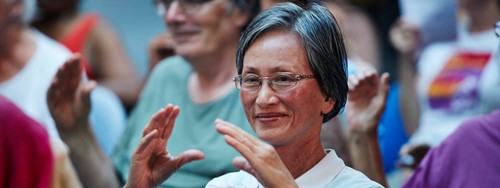Research and exercise: how everyday movements can benefit
03 September 2020
Keeping active has been proven to help reduce pain and improve function in people with arthritis.
We’ve picked a few highlights to show why dedicated research into everyday movements is important to bring positive change for future treatments.
Does running increase the risk of osteoarthritis?
The HALO study is being conducted by our Centre for Sport, Exercise and Osteoarthritis, and involves evaluating individuals who participate regularly in recreational running and the development of knee osteoarthritis over time.
For most people who do moderate exercise, there’s no increased risk of osteoarthritis, and they benefit from a healthy lifestyle choice without a great risk of injury.
The research centre will be following a group of runners over 15 years, observing the amount of running they do and any injuries they have, to see if these factors impact their joint health later in life.
Read more about the links between sport, exercise and osteoarthritis.
Our centre is sharing their runner cohort data with our pain centre to explore the effect of the COVID-19 pandemic on the population.
Can footwear, physiotherapy or exercise help improve long-term options of knee replacement surgery?
OPPORTUNITY is a pilot study looking at non-operative care given before surgery, to see if it can help to improve long-term outcomes of knee replacement surgery. This includes options such as footwear, exercise and diet advice.
There’s good evidence that pain relief medication, physiotherapy, shock absorbing shoes/insoles and keeping active can reduce pain in people with knee osteoarthritis.
Unfortunately, these measures are often not in place before the patient has a total knee replacement, as the uncontrolled pain symptoms make it difficult for people with osteoarthritis to diet or adhere to physiotherapy.
However, these steps are important to build up muscles prior to surgery, and a reduction in pain symptoms can help improve quality of life.
The hope is that by using this package of pre-operative care people will be more satisfied with their joint replacement. Also, it could help to reduce complications after surgery, and encourage people to continue exercising after their joint replacement.
Read more about our research into the use of non-operative osteoarthritis treatments.
How can we improve rehabilitation from injury or surgery using biomechanical analysis?
Our Biomechanics and Bioengineering Research Centre Versus Arthritis based at Cardiff University are looking at improving rehabilitation from a knee injury or surgery.
The research aims to develop a better understanding of our everyday joint movements, the onset of osteoarthritis and injury recovery.
The studies will provide invaluable information to help us understand how best to treat arthritis, enabling us to develop new therapies and prevention strategies. For example, whether helping to improve balanced movement in the knee could delay the onset of osteoarthritis and reduce the need for or delay having a knee replacement.
The centre have also developed targeted exercises for people with lower back pain, resulting in the BACK-on-LINE tool. The tool is being used to help workers across the NHS and Transport of London staff.
Read more about our research
We’ll keep you posted on progress and updates, find out more about our research.
We’re here whenever you need us.
- If you would like to talk to someone, you can call our free helpline on 0800 5200 520 (Monday to Friday, 9am to 8pm)
- Join our online community
- Stay in touch and follow us on Twitter, Facebook and Instagram.
You might also be interested in...
-
Exploring the relationship between sport, exercise and osteoarthritis
As part of our 'Meet the Researchers' series, James tells us more about his role and why research into exercise and osteoarthritis is so important.
-
Wearable devices: how is tracking movement helping research?
Find out more about how the data from wearable devices is changing our approach to research and the benefits towards self-management for people with arthritis.